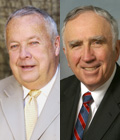Dec. 19, 2012 – In the past year, WisBar InsideTrack received a number of timely and relevant article submissions from lawyers discussing legislative actions and judicial decisions, substantive legal issues, practice management, ethics, human interest, and other developments.
Now, we’ve compiled a list of the year’s top 10 articles from InsideTrack, the State Bar of Wisconsin’s bimonthly online publication, which serves as a platform for attorneys to showcase their knowledge while delivering valuable information to State Bar members.
Here’s the list:

1. Landlord-tenant Law: Rights, Remedies, and Changes under New Act 143 (April 4)
The Wisconsin Legislature made significant changes to landlord-tenant law in March 2012, and Milwaukee lawyer Tristan Pettit helped landlord tenant lawyers navigate the changes in his article discussing 2011 Wisconsin Act 143.
Some of those changes include severability of rental agreement provisions, disposal of abandoned property, disclosure of code violations, withholding from tenant’s security deposit, acceptance of past due rent, and application to commercial leases. Importantly, Pettit discusses some “confusing” changes that could be problematic for lawyers in the future.
“Due to the rapid pace at which this law was drafted and enacted, there are some confusing provisions that make it difficult to predict the long-term impacts,” he wrote.

2. Jimmy Anderson Won’t Let Personal Tragedy Dictate His Life (Dec. 5)
In August of 2010, Jimmy Anderson was about to enter his third year at U.W. Law School when a tragic event changed his life forever. He became paralyzed in a car accident that killed his mother, father, and little brother. Now, he’s about to graduate from law school.
In his article, State Bar Legal Writer Joe Forward tells the heartbreaking but inspirational story of a soon-to-be-lawyer with the drive to succeed despite the challenges.
“There is a fire and fight in him that is unmatched by most people I have ever known, and there is a never-ending desire to want more for himself and his wife,” said Roisin Bell, a Madison lawyer who knows Jimmy. “He is truly a role model and an inspiration to the people he meets.”

3. Automatic Renewal Clauses in Business Contracts Now Regulated (Feb. 1)
Wisconsin law requires businesses, including health care providers and insurers, to notify customers of automatic renewal or extension provisions in business contracts.
And as Madison lawyer Barbara Zabawa explained in her article, the law impacts a lot of contracts, including ones involving equipment and services, construction, food service, consulting, information technology, manufacturing, insurance, to name a few.
Zabawa explained exactly what specific business contracts are implicated by the law, and how lawyers should counsel clients to comply with the requirements imposed by it.
“Businesses that fail to notify customers will not be able to enforce their renewal or extension provisions and the business contract will terminate at the end of its current term,” she wrote.

4. Ethics Committee: Lawyers Should Take Steps to Remove Materially Significant Metadata (Sept. 19)
Got metadata? You know, the embedded information contained within electronic documents that describes the document’s history, tracking, management, and other characteristics?
Turns out, lawyers who send electronic documents must be careful not to send materially significant metadata within the document, according to a recent opinion by the State Bar’s Professional Ethics Committee. In his article, Joe Forward provides the overview.
“The opinion highlights lawyers’ duty to detect and remove materially significant metadata before sending an electronic document, whether lawyers receiving electronic documents may actively “mine” for metadata (and whether they are actually compelled to search for it), and what receiving lawyers must do if they uncover significant metadata,” he writes.

5. Technology: 10 things lawyers can do with the software they already have (Jan. 4)
Are you making the best use of the technology tools you already have, such as Adobe Acrobat or Microsoft Office? State Bar technology guru and practice management advisor Nerino Petro kicked off the year with 10 useful technology tips to save you time, money, and headaches.
“With the increased use of electronic documents, create a digital image of your signature for signing electronic documents. This eliminates the need to generate paper documents for physical signatures, saving paper and time,” wrote Petro, offering up tip No. 1.

6. Health Care Reform Upheld: What Now for Employers? (July 5)
After the summer’s biggest decision came down from the U.S. Supreme Court upholding the Affordable Care Act, Milwaukee lawyer Todd Cleary chimed in to discuss the law’s requirements and what it means for employers and the lawyers who counsel them.
“Wisconsin employers that sponsor health plans should move immediately to comply with the Act’s health insurance requirements,” Cleary wrote in his article.

7. Legal Proceedings: What is a John Doe Investigation Anyway? (Feb. 15)
As news of a so-called “John Doe” investigation concerning the activities of persons connected to Gov. Scott Walker started to unfold, we asked veteran criminal lawyer Marcus Berghahn of Madison to explain what a John Doe investigation really is under Wisconsin’s law.
In his article, Berghahn provided some historical perspective on John Doe investigations, while making sense of their purpose and procedure.
“Unlike normal criminal proceedings, which can be initiated if there is probable cause to believe a person has violated the law, John Doe proceedings help law enforcement develop the evidence necessary to establish the very existence of probable cause,” Berghahn wrote.

8. Concussion Law and Youth Sports: A New Law That Protects the Head (July 18)
Noting that nearly 67,000 concussions are diagnosed each year in high school football alone, Madison lawyer and State Bar President-elect Patrick Fiedler explained a new Wisconsin law regarding the rules and procedures for dealing with concussions and head injuries sustained while participating in youth athletic activities, just in time for fall football season.
“The law ensures everyone who is involved in youth sports – organizers, participants, coaches, parents and officials – understands the nature and risk of concussions and sets a mandatory procedure for when such an injury is suspected. Therefore, those involved with organized youth athletic activities, as well as the lawyers who advise them, should be aware of the new duties and obligations created under the statute,” Fiedler wrote in his article.

9. The Legal Issues Deciding Act 23: Wisconsin’s Voter ID Law (Oct. 17)
A Dane County Circuit Court judge fueled some fires with a decision to halt a Wisconsin law, 2011 Wis. Act 23, requiring photo ID to vote. And as the lawsuits pressed on, Milwaukee lawyers John Loringer and Daniel Griffin were there to make sense of the legal issues.
In their article, they gave a brief breakdown of the two cases that questioned the constitutionality of voter ID requirements and highlighted the underlying procedural issues of temporary injunctive relief and standing, just as Wisconsin prepared for a round of elections.
“Although challenges to voter ID laws have received considerable media coverage, little attention has been paid to the legal mechanisms relied on by the plaintiffs challenging Act 23,” wrote Loringer and Griffin.

10. 50-year Members: Boyle and McCann Share Unique History, Including Infamous Case (May 2)
Gerald Boyle and E. Michael McCann, adversaries in the 1992 trial against Milwaukee’s infamous serial killer Jeffrey Dahmer, recounted their careers in this article from Joe Forward highlighting members celebrating 50 years in the profession.
“The Dahmer case was certainly the biggest one of my career,” said Boyle, who had argued unsuccessfully that Dahmer was insane. “That was quite an experience,” said McCann, who noted that prosecuting murder involves intense effort. “But this was a serial killer.”

11 (Bonus Article): Uncertainty over Act 10 Continues Following "Unconstitutional" Decision: Author Reviews Central Legal Issues
2011 Wisconsin Act 10, the law curbing collective bargaining rights for public employees, took center stage in 2011 and made national headlines. In 2012, a Dane County Circuit Court judge struck down portions of Act 10, and Madison lawyer Timothy Edwards provided the insight.
“While the court’s decision is not the last word on this politically charged topic, it provides an excellent roadmap of the central legal issues surrounding Act 10, including its controversial restriction on collective bargaining,” Edwards wrote in his article.
The Gifts that Keep on Giving
WisBar allows members to access our online archive of State Bar publications, including InsideTrack and the Wisconsin Lawyer magazine. We noticed that members continue to access several InsideTrack articles published last year. We thought we would mention them here as the gifts that keep on giving, just in case you missed them.
Got an Idea? Want to Submit an Article?
The State Bar welcomes member ideas for articles and article submissions. InsideTrack provides an opportunity for lawyers build their practices by showcasing knowledge in specific areas of law through by-lined articles, with editing support from experienced State Bar editors.
Contact Joe Forward by email at jforward@wisbar.org, or by phone at (800) 728-7788, ext. 6161, or (608) 250-6161 about topic ideas, and review the writing guidelines.
